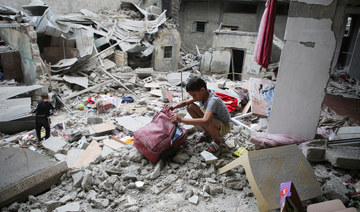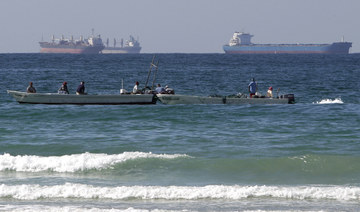MEXICO CITY: Mexican President Enrique Pena Nieto on Thursday called off a meeting with Donald Trump as tensions over the US leader’s vow to make Mexico fund a new wall on the neighbors’ border boiled over.
Trump had been scheduled to receive Pena Nieto at the White House next week, for their first meeting since the inauguration. Instead, the Republican president is facing a foreign policy spat during his first week in the Oval Office.
But their escalating war of words over who would fund the proposed border wall — a central pledge made by Trump during his successful presidential campaign — escalated to the breaking point on Thursday.
“If Mexico is unwilling to pay for the badly needed wall, then it would be better to cancel the upcoming meeting,” Trump said on Twitter in the morning.
The bareknuckle early-morning tweet — already a signature Trump move — shocked diplomats, but was in keeping with the mogul’s hardball approach to negotiations and is likely to delight his supporters. Pena Nieto didn’t take long to rise to the challenge.
“We informed the White House this morning that I will not attend the working meeting scheduled for next Tuesday” with Trump in Washington, the Mexican leader responded on Twitter.
“Mexico reiterates its willingness to work with the United States to reach agreements in both nations’ interests.”
White House spokesman Sean Spicer told reporters that the “lines of communications” would remain open and Washington hoped to “schedule something in the future.”
The first salvos between the two presidents came Wednesday, when Trump ordered officials to begin to “plan, design and construct a physical wall” along the 3,200km US-Mexico border.
Stemming immigration was a central plank of Trump’s election campaign, but he has struggled to articulate how the wall will be paid for, beyond saying “Mexico will pay.”
Republican leaders announced Thursday they would try to carve out $12-15 billion worth of US taxpayers’ money for the project.
Trump’s order had put Pena Nieto under fierce domestic pressure to hit back, and hit back the Mexican leader did in a video message to the nation late Wednesday.
“I regret and condemn the decision of the United States to continue construction of a wall that, for years, has divided us instead of uniting us,” Pena Nieto said.
“I have said it time and again: Mexico will not pay for any wall,” he added.
Around two in three Mexicans have a favorable opinion of the US, according to Pew surveys, but anti-American and anti-Trump sentiment is not uncommon.
Pena Nieto saw his own approval rating slide late last year, after he hosted Trump — then still a White House candidate — in Mexico City.
Trump also took to Twitter on Thursday to gripe about the trade gap between Mexico and the United States.
“The US has a 60 billion dollar trade deficit with Mexico. It has been a one-sided deal from the beginning of NAFTA with massive numbers of jobs and companies lost,” he said.
That deficit for the trade in goods is slightly higher than the overall trade deficit -- including services -- of $49 billion in 2015.
Trump has vowed to renegotiate the 23-year-old North American Free Trade Agreement between Mexico the United States and Canada.
That renegotiation could provide one way for Trump to claim victory, through increased tariffs on Mexican goods or higher border transit costs.
But it could also risk retaliatory tariffs or blowback from US firms who export $267 billion a year south of the border.
Trump has also ordered officials to scour US government departments and agencies in search of “direct and indirect” aid or assistance to the Mexican government and report back within 30 days.
The United States is expected to provide about $134 million worth of assistance to Mexico this year, with much of the spending wrapped up in the “Merida Initiative” to combat drug cartels.
Trump was in Philadelphia on Thursday for a Republican congressional retreat, where he will have to calm some jitters.
While Trump has pursued a solidly conservative governing agenda, his outbursts over inauguration crowd size, his war of words with the media, and revival of his claim of massive voter fraud has led to concerns within his own party.
The Philadelphia meeting will feature another high-profile guest: British Prime Minister Theresa May, who will become the first foreign leader to meet Trump since his inauguration.
May, who addresses the Republican retreat shortly after Trump, will almost certainly discuss the prospects of a key post-Brexit trade deal with the United States.
The two leaders will meet in Washington on Friday and hold a joint news conference, the White House said.
US authorities lack resources to process Haitians quickly enough, leading Mexican authorities to create a ticketing system that leaves them waiting in Tijuana for weeks. Migrant shelters are full, forcing many to sleep on the streets.
Fences and other barriers already blanket about 700 miles of border, much of it in California and Arizona. In San Diego, they helped to virtually shut down what was the busiest corridor for illegal crossings in the 1990s. It’s now one of the most fortified stretches of landscape on the 2,000-mile divide between the two countries.
Border Patrol sector chiefs were asked in November to identify areas where the fence could be expanded, though Trump and his advisers have yet to detail their next steps. Brandon Judd, president of the National Border Patrol Council and a member of Trump’s transition team, supports building a wall in strategic locations and reinforcing existing barriers in certain areas but not where there are natural obstacles, like the Rio Grande river in Texas.
“We do not need a Great Wall of China from California to Texas,” Judd said in an interview last week.
Away from the border, Trump drew support from his base. Tammy Allen, a 52-year-old supporter from Baton Rouge, Louisiana, applauded Trump’s interest in curbing the number of refugees coming to the US and building a wall.
“A lot of countries do. Why not us? Something has got to be done,” she said.
Mexico president cancels Trump talks in US wall row
Mexico president cancels Trump talks in US wall row
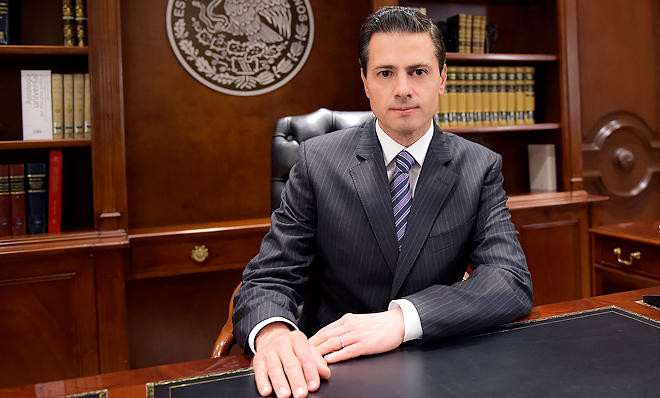
Afghan Taliban’s treatment of women under scrutiny at UN rights meeting
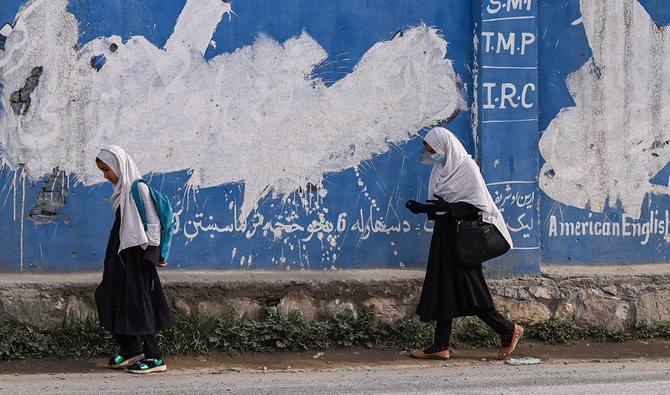
- The Taliban say they respect rights in line with their interpretation of Islamic law
- Taliban have barred girls from high school and women from universities and jobs
GENEVA: Afghanistan’s Taliban face criticism over their human rights record at a UN meeting on Monday, with Washington accusing them of systematically depriving women and girls of their human rights.
However, in an awkward first for the UN Human Rights Council, the concerned country’s current rulers will not be present because they are not recognized by the global body.
Afghanistan will instead be represented by an ambassador appointed by the previous US-backed government, which the Taliban ousted in 2021.
In a series of questions compiled in a UN document ahead of the review, the United States asked how authorities would hold perpetrators to account for abuses against civilians, “particularly women and girls who are being systematically deprived of their human rights“?
Britain and Belgium also raised questions about the Taliban’s treatment of women. In total, 76 countries have asked to take the floor at the meeting.
The Taliban say they respect rights in line with their interpretation of Islamic law.
Since they swept back into power, most girls have been barred from high school and women from universities. The Taliban have also stopped most Afghan female staff from working at aid agencies, closed beauty salons, barred women from parks and curtailed travel for women in the absence of a male guardian.
Under the US system, states’ human rights records are subject to peer review in public meetings of the Geneva-based Human Rights Council, resulting in a series of recommendations.
While non-binding, these can draw scrutiny of policies and add to pressure for reform.
The UN Human Rights Council, the only intergovernmental global body designed to protect human rights worldwide, can also mandate investigations whose evidence is sometimes used before national and international courts.
Indian students protest US envoy’s campus talk over Gaza war
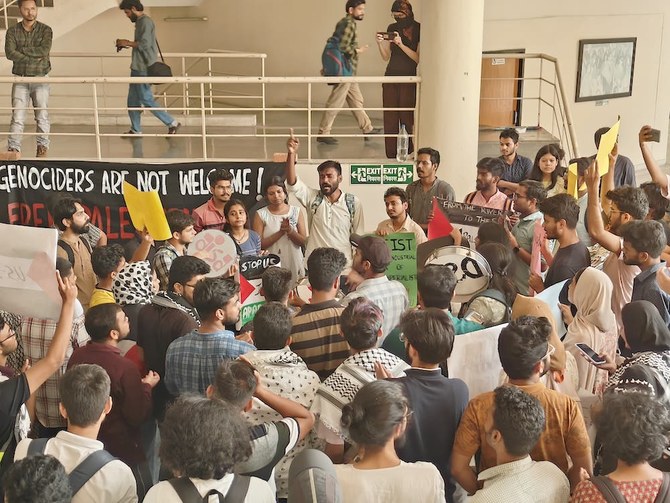
- Student-led protest led to university canceling an event involving US ambassador
- Indian students say they stand in solidarity with students protest across US
NEW DELHI: Students at one of India’s most prominent universities gathered in protest over an event involving the US ambassador to New Delhi on Monday, as they stood up against American support for Israel’s war on Gaza.
US Ambassador to India Eric Garcetti was invited for a talk on US-India ties at the Jawaharlal Nehru University in New Delhi on Monday afternoon, which would take place amid protests on American campuses demanding their universities cut financial ties with Israel over its military offensive in Gaza, which has killed more than 34,000 Palestinians.
At the university’s convention center, over 100 students organized by the Jawaharlal Nehru University Student Union protested the invitation of Garcetti, calling out his complicity “in the genocide Israel is currently doing in Palestine.”
JNUSU President Dhananjay told Arab News: “By calling such a person in the university … who is supporting the genocide, we want to tell them that JNU is not silent on this issue and we want to speak up.
“We are protesting against the US support for the genocide in Gaza committed by Israel.”
Hundreds of US college students have been arrested and suspended as peaceful demonstrations calling for a ceasefire in Gaza and divestment from companies linked to Israel spread across American campuses.
The student-led movement comes after nearly six months since Israel began its onslaught on the Gaza Strip, which Tel Aviv said was launched to stamp out the militant group Hamas.
Hundreds of thousands of housing units in the besieged territory have either been completely or partially destroyed, while the majority of public facilities, schools and hundreds of cultural landmarks have been demolished and continue to be targeted in intense bombing operations.
JNU student leaders said they stood in solidarity with the protesting students in the US.
“We are students, and we need to ask questions. If some atrocities are taking place and there are mindless killings going on, speaking out against this should be the responsibility of all sections of society,” Dhananjay said.
“The visuals that we see make us shiver and shake our conscience. If we don’t speak up, then I don’t think we have a right to be a social being.”
At the JNU campus on Monday, the student protest led to a cancellation of the event involving the US envoy.
“We feel happy that we forced the administration to cancel the talks by the ambassador,” JNUSU Vice President Avijit Ghosh told Arab News.
Despite India’s historic support for Palestine, the government has been mostly quiet in the wake of Israel’s deadly siege of Gaza.
When Indians went to the streets in the past months to protest and raise awareness on the atrocities unfolding in Gaza, their demonstrations were dispersed by police and campaigns stifled.
Members of Indian civil society have since come together to challenge their government’s links with Tel Aviv and break Delhi’s silence on Israel’s war crimes against Palestinians, reflecting similar concerns that some university students also felt.
“The US is supporting Israel in the killing of Palestinian people in Gaza. It’s also suppressing students in its country who are raising voice against the genocide in Gaza,” Ghosh said.
“We are agitated that India is being a mute spectator and not taking a clear stand against the ongoing genocide in Gaza.”
Ukraine’s Zelensky urges US to speed up weapons deliveries
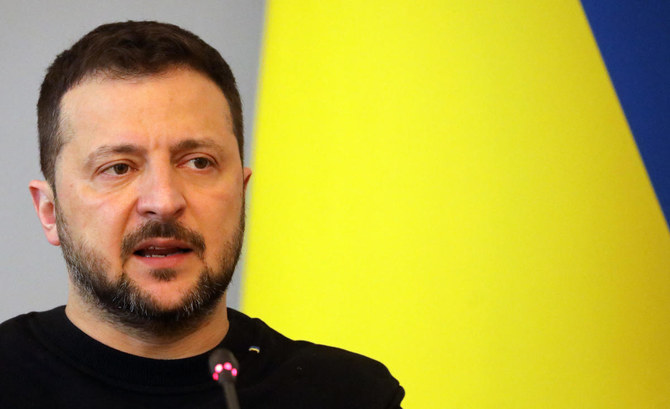
KYIV: President Volodymyr Zelensky said on Monday that vital US weapons were starting to arrive in Ukraine in small amounts and that the process needed to move faster as advancing Russian forces were trying to take advantage.
Zelensky told a joint news conference in Kyiv alongside visiting NATO chief Jens Stoltenberg that the situation on the battlefield directly depended on the speed of ammunition supplies to Ukraine.
“Timely support for our army. Today I don’t see anything positive on this point yet. There are supplies, they have slightly begun, this process needs to be sped up,” he said.
Scotland’s Humza Yousaf quits in boost to Labour before UK vote
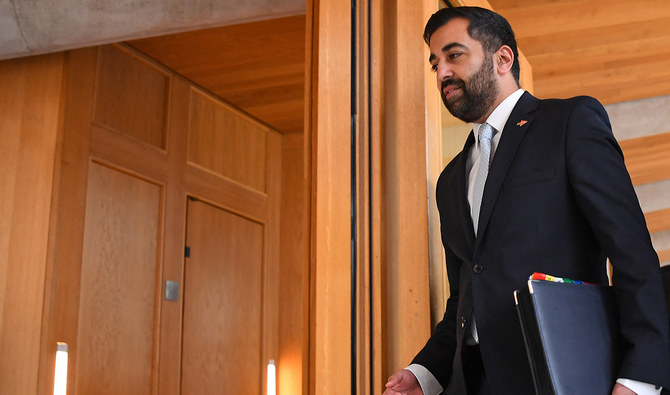
- Yousaf quit after a week of chaos triggered by his scrapping of a coalition agreement with Scotland’s Greens
- He then failed to secure enough support to survive a vote of no confidence against him expected later this week
LONDON: Scotland’s leader Humza Yousaf resigned on Monday, further opening the door to the UK opposition Labour Party regaining ground in its former Scottish heartlands during a national election expected to be held later this year.
Yousaf said he was quitting as head of the pro-independence Scottish National Party (SNP) and first minister of Scotland’s devolved government after a week of chaos triggered by his scrapping of a coalition agreement with Scotland’s Greens.
He then failed to secure enough support to survive a vote of no confidence against him expected later this week.
Resigning little over a year after he replaced Nicola Sturgeon as first minister and SNP leader, Yousaf said it was time for someone else to lead Scotland.
“I’ve concluded that repairing our relationship across the political divide can only be done with someone else at the helm,” Yousaf said, adding he would continue until a successor was chosen in an SNP leadership contest.
Yousaf abruptly ended a power-sharing agreement between his pro-independence SNP and the Green Party after a row over climate change targets. The SNP’s fortunes have faltered over a funding scandal and the resignation of Sturgeon as party leader last year. There has also been infighting over how progressive its pitch should be as it seeks to woo back voters.
Caught between defending the record of the coalition government and some nationalists’ demands to jettison gender recognition reforms and refocus on the economy, Yousaf was unable to strike a balance that would ensure his survival.
The SNP is losing popular support after 17 years of heading the Scottish government. Earlier this month, polling firm YouGov said the Labour Party had overtaken the SNP in voting intentions for a Westminster election for the first time in a decade.
Labour’s resurgence in Scotland adds to the challenge facing British Prime Minister Rishi Sunak’s Conservative Party which is lagging far behind Labour in UK-wide opinion polls.
The Scottish parliament now has 28 days to choose a new first minister before an election is forced, with former SNP leader John Swinney and Yousaf’s former leadership rival Kate Forbes seen as possible successors.
If the SNP is unable to find a new leader to command support in parliament, a Scottish election will be held. Yousaf, the first Muslim head of government in modern Western Europe, succeeded Sturgeon as first minister in March 2023. Once hugely popular, Sturgeon has been embroiled in a party funding scandal with her husband, who was charged this month with embezzling funds. Both deny wrongdoing.
Iran slams crackdown on US student protesters
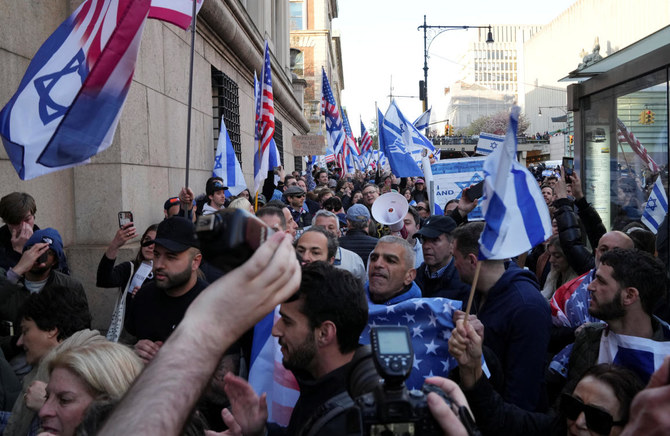
- The demonstrations began at Columbia University in New York and have since spread across the country
Tehran: Iran on Monday criticized a police crackdown in the United States against university students protesting against the rising death toll from the Israel-Hamas war in the Gaza Strip.
“The American government has practically ignored its human rights obligations and respect for the principles of democracy that they profess,” foreign ministry spokesman Nasser Kanani said.
Tehran “does not at all accept the violent police and military behavior aimed at the academic atmosphere and student demands,” he said.
American universities have been rocked by pro-Palestinian demonstrations, triggering campus clashes with police and the arrest of some 275 people over the weekend.
The demonstrations began at Columbia University in New York and have since spread across the country.
In Iran, hundreds of people demonstrated in Tehran and other cities on Sunday in solidarity with the US demonstrations.
Some carried banners proclaiming “Death to Israel” and “Gazans are truly oppressed,” state media reported.
The Gaza war broke out after the October 7 attack by Palestinian militants on Israel which killed 1,170 people, mostly civilians, according to Israeli figures.
Tehran backs Hamas, but has denied any direct involvement in the attack.
Israel’s retaliatory offensive against Hamas has since killed at least 34,488 people in Gaza, mostly women and children, according to the Hamas-run territory’s health ministry.
“What we have seen in American universities in recent days is an awakening of the world community and world public opinion toward the Palestinian issue,” Kanani said.
“It is not possible to silence the loud voices of protesters against this crime and genocide through police action and violent policies.”






